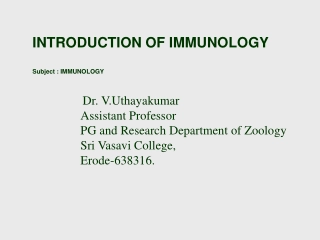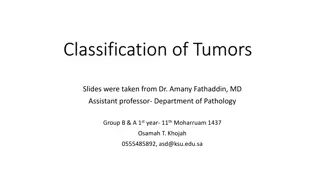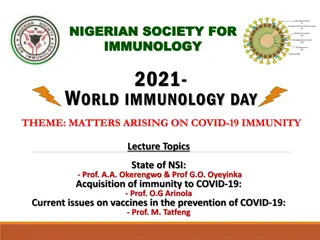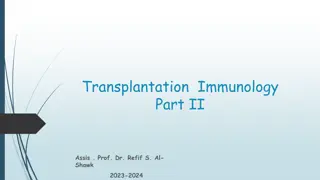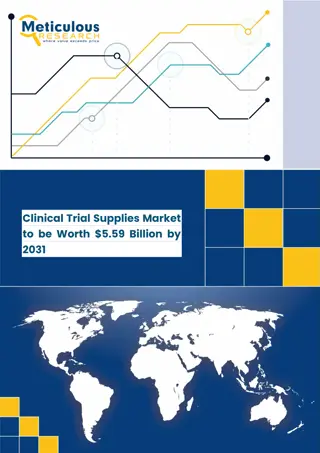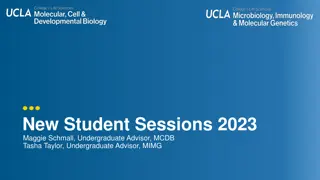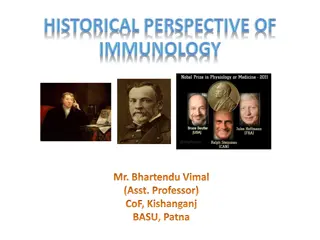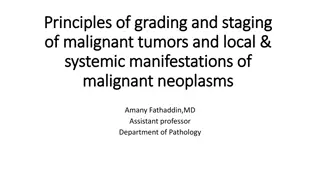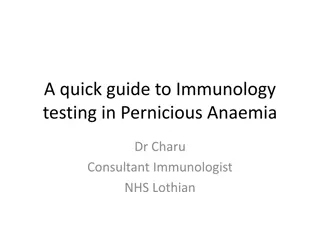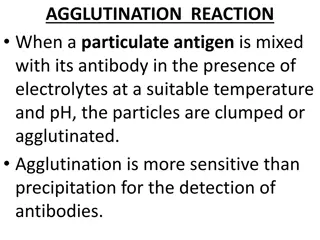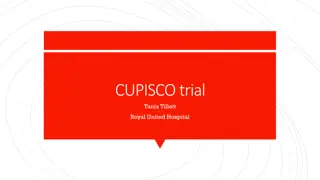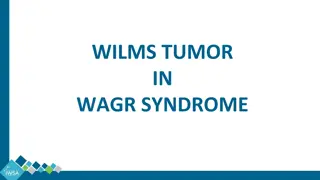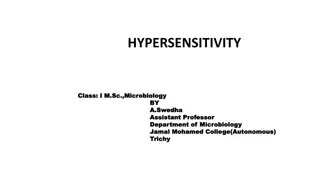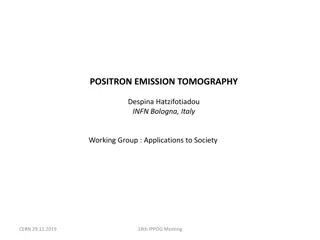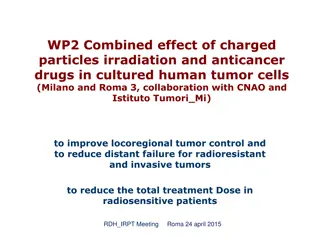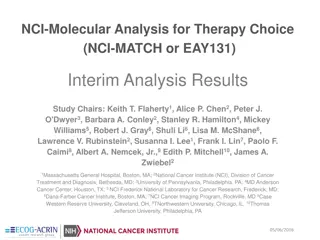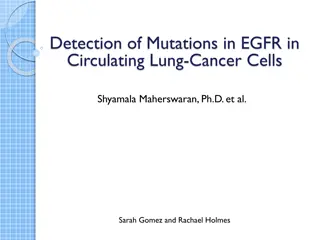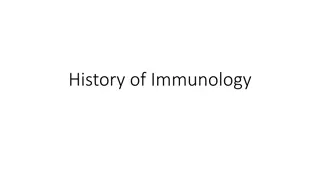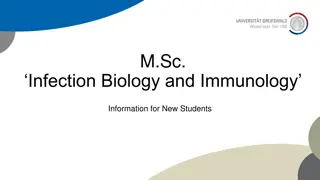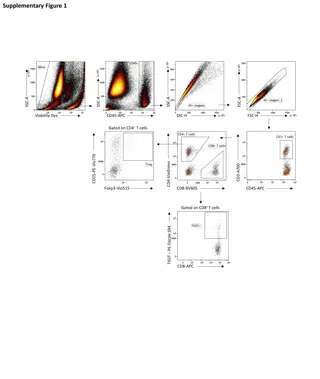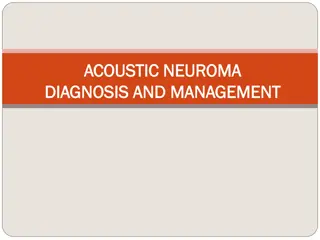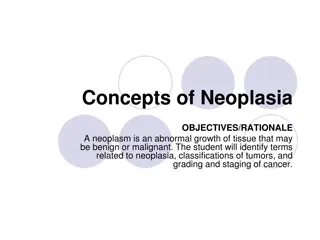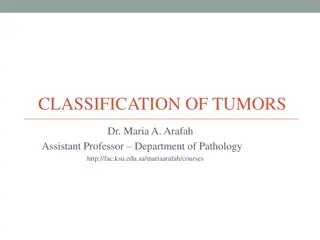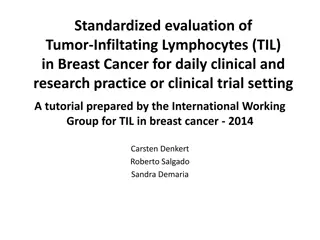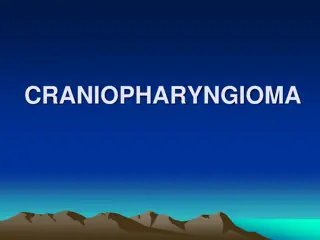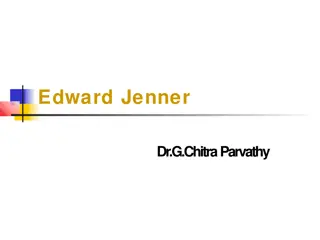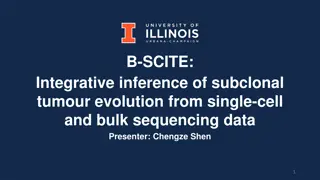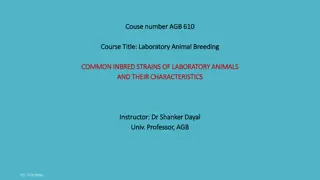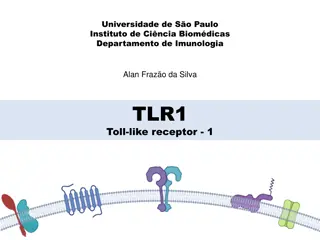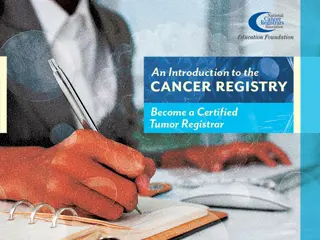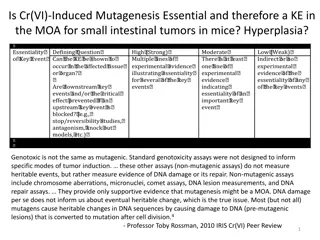INTRODUCTION OF IMMUNOLOGY
Explore the fundamentals of immunology with insights into immunogens, antigens, epitopes, and haptens. Uncover how these key components play vital roles in shaping immune responses and learn about paratopes, the basis of immunogenicity, and the key events that determine foreignness in the immune sys
0 views • 15 slides
Improving HER2 Targeting in NSCLC With Selective TKI
HER2 activation plays a crucial role in promoting tumor proliferation and survival in NSCLC. Driven by oncogenic downstream signaling pathways, HER2 overexpression and gene amplification lead to the formation of heterodimers and activation of key signaling cascades. Additionally, HER2 mutations are
0 views • 36 slides
Understanding Tumor Classification and Nomenclature in Pathology
This slideshow provides an overview of tumor classification, nomenclature, and key concepts in pathology. It covers the definitions of neoplasm, tumor, and oncology, the classification of tumors into benign and malignant categories, as well as the importance of stroma in tumor behavior. It also expl
2 views • 61 slides
Introduction to Biotechnology in Pharmaceutical Sciences: A Comprehensive Overview by Swarnakshi Upadhyay
Biotechnology in pharmaceutical sciences encompasses the application of scientific and engineering principles to utilize biological agents for various services. It includes molecular biology for production of pharmaceuticals like antibiotics, proteins, and enzymes, as well as large-scale production
0 views • 9 slides
Insights on COVID-19 Immunity and Vaccines: NSI 2021 Lecture Highlights
Delve into the cutting-edge discussions from the Nigerian Society for Immunology's 2021 World Immunology Day event, featuring lectures on the state of NSI, acquisition of immunity to COVID-19, and current vaccine issues. Learn about the structural proteins of the SARS-CoV-2 virus, the importance of
4 views • 46 slides
Transplantation Immunology
Learn about histocompatibility systems, alloantigen recognition, graft types, graft rejection mechanisms, graft-versus-host disease risk factors, HLA typing methods, and detecting HLA antibodies in clinical transplantation. Explore hyperacute and acute rejection episodes, their immunological mechani
4 views • 11 slides
Comprehensive Spine Tumor Surgery at Medspine Hospital in Chennai
Discover the best spine tumor treatment at Medspine, the leading hospital with top surgeon and specialist in Medavakkam, Perumbakkam, Royapettah, Chennai.
3 views • 2 slides
Clinical Trial Supplies Market to be Worth $5.59 Billion by 2031
Clinical Trial Supplies Market by Phase (I\u2013IV), Service (Manufacturing, Packaging, Logistics, Documentation), Type (Biologics, Small Molecules, Medical Devices), Therapeutic Area (Oncology, Cardiology, CNS, Immunology, Respiratory), End User, and Geography - Global Forecast to 2031
3 views • 4 slides
Best treatment for Acupuncture in Orchard
HSI Chinese Medicine serves the Best treatment for Acupuncture in Orchard. They offers services from consultation, acupuncture, acupressure to cupping. Their specialities include immunology & cancer complementary care, musculoskeletal & neurological related symptoms, pain management, respiratory iss
2 views • 6 slides
New Student Sessions 2023 - MCDB & MIMG Advising Information
The New Student Sessions 2023 offer valuable resources and advising information for Molecular, Cell, and Developmental Biology (MCDB) as well as Microbiology, Immunology, and Molecular Genetics (MIMG) undergraduate majors at UCLA. Learn about MCDB and MIMG major requirements, upper-division core cou
0 views • 21 slides
Life Sciences Degree Options and Curriculum at University of Glasgow
Explore the diverse range of Life Sciences degree choices available at the University of Glasgow, including Animal Biology, Biomolecular Sciences, Human Life Sciences, and Infection & Immunology. Learn about the flexible curriculum structure, career prospects, and research-based work placements offe
2 views • 20 slides
Overview of Immunology: From Historical Perspectives to Modern Techniques
Immunology is the study of the immune system, its functions, and responses to various stimuli. The field traces back to ancient times, with historical figures like Thucydides and Edward Jenner contributing to its development. From innate immunity to adaptive responses, the immune system plays a cruc
0 views • 29 slides
Understanding Grading and Staging of Malignant Tumors in Cancer Patients
Grading and staging are crucial in determining the aggressiveness and extent of malignant tumors. Grading involves assessing the level of malignancy based on cell differentiation and mitotic activity, while staging considers the size of the tumor, lymph node involvement, and presence of metastases.
7 views • 31 slides
Immunology Testing in Pernicious Anaemia: A Quick Guide
The article by Dr. Charu, a Consultant Immunologist, provides insights into immunology testing for Pernicious Anaemia (PA). It covers considerations for PA diagnosis, prevalence data, and details intrinsic factor antibody and gastric parietal cell antibody tests. Guidelines for diagnosis and treatme
0 views • 9 slides
Understanding Agglutination Reactions in Immunology
Agglutination reaction is a key technique in immunology where particulate antigens and antibodies clump together in the presence of electrolytes. This reaction is highly sensitive and often used for antibody detection, bacterial identification, blood grouping, and cross-matching. The process involve
0 views • 20 slides
Understanding Antigens and Immunogenicity in Immunology
Learn about antigens, immunogenicity, antigenicity, and epitopes in immunology. Antigens are substances with distinct immunologic properties, while immunogenicity refers to the ability of an antigen to induce an immune response. Antigenicity is the ability of an antigen to combine specifically with
0 views • 41 slides
Molecularly-Guided Therapy vs Platinum Chemotherapy in CUP Patients
This trial aims to compare the efficacy and safety of molecularly-guided therapy or cancer immunotherapy based on genomic profiling with platinum-based chemotherapy in patients with cancer of unknown primary site. The study design includes multiple treatment regimens guided by genomic profiles, with
4 views • 9 slides
Understanding Wilms Tumor in WAGR Syndrome
WAGR syndrome is a rare genetic condition associated with Wilms Tumor, aniridia, and developmental delays. Wilms Tumor is a form of kidney cancer mostly affecting children and is linked to genetic disorders like WAGR syndrome. The risk of Wilms Tumor is higher in children with WAGR syndrome, with po
1 views • 14 slides
Understanding Hypersensitivity Reactions in Immunology
Hypersensitivity in immunology refers to an altered immune response against antigens, leading to hyperreactivity and immunopathology. This article delves into the different categories of adaptive hypersensitivities, focusing on Immediate (Type I), Antibody-Mediated Cytotoxic (Type II), and Immune Co
0 views • 6 slides
Positron Emission Tomography: Applications in Society and Recent Developments
Positron Emission Tomography (PET) is a medical imaging technique focusing on metabolic differences in the body. By using positron-emitting radioisotopes, PET can detect how molecules are taken up by healthy and cancerous cells, aiding in accurate tumor localization with lower doses. The evolution o
0 views • 6 slides
Combined Effect of Charged Particles Irradiation and Anticancer Drugs in Cultured Human Tumor Cells
Research collaboration aimed to enhance locoregional tumor control and reduce distant failure by combining charged particles irradiation and anticancer drug Epothilone B in cultured human tumor cells from Milano and Roma. The study explores the impact on clonogenic survival, growth curves, and deter
0 views • 13 slides
Understanding Gamma Knife Stereotactic Radiosurgery
The Gamma Knife Stereotactic Radiosurgery is a precise and effective treatment method where highly focused radiation beams are used to target tumors and abnormalities in the brain. It does not remove the tumor directly but affects DNA, cell growth, and blood vessels. The procedure involves three mai
0 views • 51 slides
NCI-MATCH Trial Interim Analysis Results and Status Update
NCI-MATCH is a groundbreaking clinical trial aiming to match tumor gene alterations with targeted therapies. The interim analysis results revealed impressive patient enrollment and site participation exceeding expectations. Despite challenges with pausing new patient registrations for the analysis,
0 views • 26 slides
Detection of Mutations in EGFR in Circulating Lung Cancer Cells: Study on SARMS Assay and CTC-Chip
This study by Shyamala Maherswaran, Ph.D., and team focuses on characterizing mutations in EGFR in circulating tumor cells using SARMS assay and CTC-chip. The research investigates the effectiveness of these non-invasive methods in analyzing tumors and explores the role of the T790M mutation in resp
0 views • 12 slides
Understanding Immunology: Key Players and Processes
Explore the world of immunology through key components such as monocytes, macrophages, lymphocytes, interferons, and the inflammatory reaction. Learn about the roles of various immune cells in defending the body against pathogens and the mechanisms of inflammation in response to tissue damage or inf
0 views • 16 slides
Pioneers of Immunology: Jenner, Ehrlich, and Metchnikoff
Edward Jenner initiated the concept of vaccination by discovering that cowpox could confer immunity to smallpox. Paul Ehrlich differentiated blood cells, proposed the side chain hypothesis, and pioneered serum therapy and chemotherapy. Elie Metchnikoff developed the cellular theory of immunity, advo
0 views • 4 slides
Master's Program in Infection Biology and Immunology at University of Greifswald
The Master's Program in Infection Biology and Immunology at University of Greifswald offers a comprehensive curriculum with access to state-of-the-art facilities and institutes such as the Friedrich-Loeffler-Institut and the Helmholtz Institute for One Health. The program includes working groups in
0 views • 26 slides
Immune Cell Analysis Supplementary Figures
This collection of supplementary figures provides detailed flow cytometry data on immune cell populations, including CD4+ T cells, CD8+ T cells, tumor-associated macrophages, and more. The figures also include information on immune checkpoint molecules like PD-L1 and TIGIT. Each figure presents spec
0 views • 4 slides
Understanding Acoustic Neuroma: Diagnosis and Management
Vestibular schwannoma, also known as acoustic neuroma, is a common tumor in the cerebellopontine angle. It can be sporadic or associated with neurofibromatosis type 2. Patients typically present with hearing loss and tinnitus, which may be gradual or sudden. Grading systems like Koos, Ojemann, and J
0 views • 75 slides
Understanding Neoplasia and Cancer: Key Concepts and Biological Aspects
Neoplasia encompasses abnormal tissue growth that can be benign or malignant. This article explores neoplastic terms, tumor classifications, cancer staging, and genetic factors in cancer development. Gain insights into the characteristics of benign tumors, the biology of cancer including carcinogene
0 views • 29 slides
Classification of Tumors: A Comprehensive Overview
Understanding the classification of tumors is crucial in the field of pathology. This detailed overview covers the definitions of neoplasia and tumors, the differentiation between benign and malignant tumors, nomenclature, and characteristics of various tumor types. It discusses the behaviors of ben
1 views • 34 slides
Tutorial on Standardized Evaluation of Tumor-Infiltrating Lymphocytes in Breast Cancer
This tutorial, prepared by the International Working Group for TIL in breast cancer, provides guidelines for pathologists on the standardized evaluation of tumor-infiltrating lymphocytes (TILs) in breast cancer based on H&E slides of core biopsies or tumor resections. It details steps such as defini
0 views • 14 slides
Comprehensive Overview of Craniopharyngioma: History, Pathology, and Treatment Considerations
Craniopharyngioma is a complex intracranial tumor with a rich historical background dating back to the early 20th century. Initially described by McLean, Frazier, Alpes, and famously studied by Cushing, this tumor continues to be a subject of debate and controversy in terms of treatment approaches a
0 views • 76 slides
Largest Red-Blue Separating Rectangles Study
This study explores the problem of finding the largest area axis-aligned B-empty rectangle containing n red points and m blue points. The research discusses various extensions to the original problem, such as the Blue Rectangles problem and the Outliers Problem, aiming to achieve efficient solutions
0 views • 20 slides
Edward Jenner: Pioneer of Smallpox Vaccine and Father of Immunology
Edward Jenner, a renowned figure in medical history, was born on May 17, 1749. He made significant contributions to immunology by developing the smallpox vaccine. His pioneering work involved inoculating individuals with cowpox to confer immunity against smallpox, a disease that was highly feared fo
0 views • 13 slides
Integrative Inference of Tumor Evolution from Single-Cell and Bulk Sequencing Data
Cancer's complex evolution introduces challenges in treatment response. B-SCITE aims to enhance tumor phylogeny inference by integrating bulk sequencing and single-cell data using a probabilistic approach. It addresses the complexity of tumor cell populations and potential treatment failure causes.
0 views • 20 slides
Laboratory Animal Breeding: Common Inbred Strains and Characteristics
This course, AGB 610, on Laboratory Animal Breeding covers common inbred strains of laboratory animals and their unique characteristics. Detailed information is provided on popular strains like C57BL/6, C3H, BALB/c, DBA/2, CBA, and more, highlighting their susceptibility to diseases, tumor incidence
0 views • 7 slides
TLR1 - Toll-like Receptor-1 in Immunology Research at University of São Paulo
Alan Frazão da Silva from the Department of Immunology at the University of São Paulo's Institute of Biomedical Sciences is conducting research on TLR1, a Toll-like receptor involved in immune responses against gram-negative bacteria and autoimmune diseases like Type 1 Diabetes and Graves' disease
0 views • 5 slides
Certified Tumor Registrar (CTR) Examination Eligibility and Career Opportunities
Learn about the eligibility requirements for sitting for the Certified Tumor Registrar (CTR) examination, which include formal education and experience. Discover the different paths to meeting the eligibility criteria, such as obtaining an Associate's Degree in Cancer Registry Management or gaining
0 views • 11 slides
Essentiality of Cr(VI)-Induced Mutagenesis in Small Intestinal Tumor Development in Mice
Cr(VI)-induced mutagenesis is a key event in the mode of action for small intestinal tumors in mice, with the question of whether it is an essential step in tumor development. The interaction of cellular components with Cr leads to cell proliferation, hyperplasia, and ultimately mutagenesis. Differe
0 views • 4 slides
